We are delighted to announce the expansion of the program to more districts and to more than 30 independent and chain coffee shops. Find more details here & experience the zero-waste takeaway journey!
The six coffee shops in Sheung Wan joined hands with Greenpeace and launched the Sheung Wan Borrow and Return Cup Program in Hong Kong in July 2022. Supported by a mobile app, the Program showcases the replacement of disposable tableware with reusable ones as a feasible practice. Hongkongers are consuming 400 million takeaway disposable coffee cups daily; the reusable cup scheme is a new practice for Hong Kong people. Why are the coffee shop owners willing to participate in the Program? Any concerns about hygienic issues reusing cups? Let’s hear the voices of the participating coffee shops and responses from their customers.
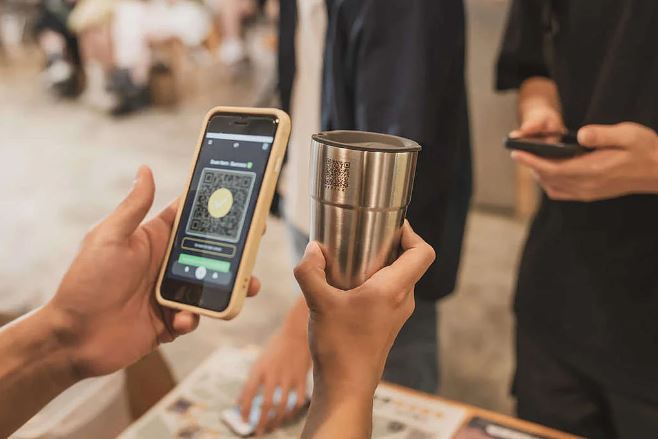
Espresso Remedy: Turning the Chaotic Earth into a Beautiful Place, Why Not?
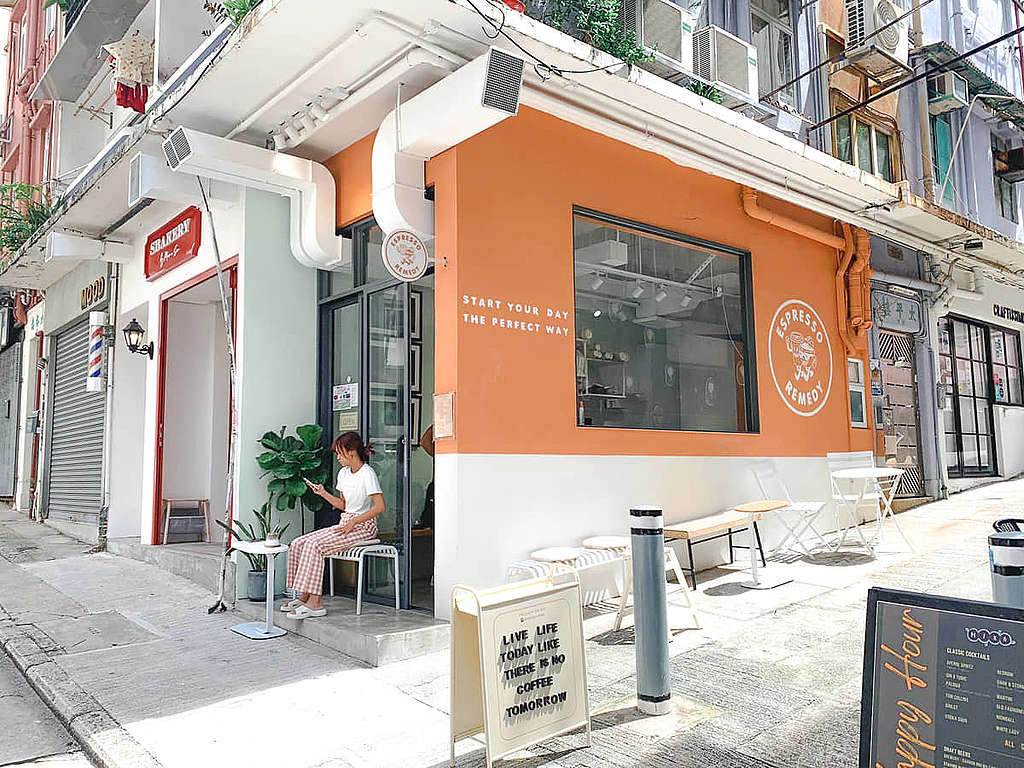
Greenpeace’s “Coffee Break with Endy” took place on July 30. Espresso Remedy’s Bien coached Hong Kong singer-songwriter Endy Chow on the secrets of brewing a craft coffee. She highlighted how coffee is closely related to environmental protection, “coffee bean is a kind of fruit, the harvest of which is subject to the climate changes across regions. (It’s crucial) everyone joins hands to remedy the global warming issue.”
Take-away services are the main source of income for the coffee shop. The shop offers free used grounded coffee and reusable cups for takeaway delivery to neighbour customers. “Sheung Wan Borrow and Return Cup Program sheds light on offering core solutions to busy lives in the city: time and convenience.” Bien went on and revealed positive responses from the customers. During the first week of the Program launch, about 30 customers joined it at her shop, and she expected the reusable cup program would become more popular.
The Tiny Island: Eco-friendly Hidden Island in North Europe style
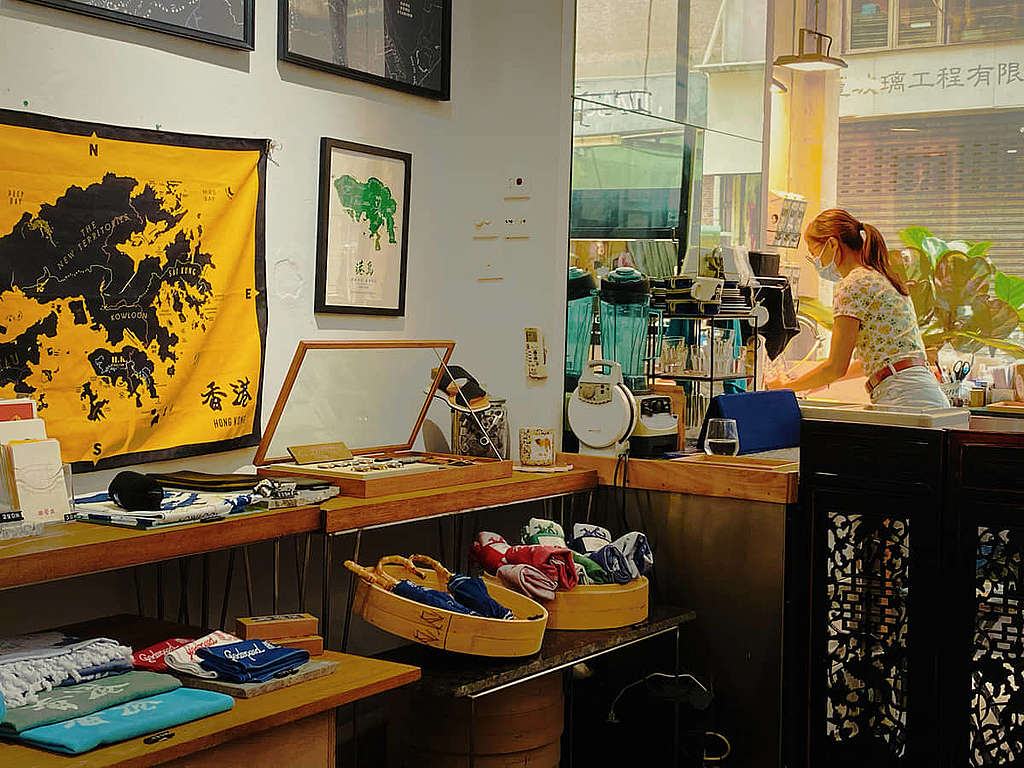
Blackboards along the road direct customers to a tranquil hidden “island” behind a glass door at Square Street. The shop name “Tiny Island” reveals the surname of its Swede shop owner, Alexis, resembling his connection with the Hong Kong island for 13 years since he settled on it. He was happy to be a part of the Sheung Wan Borrow and Return Cup Program, “It’s a new initiative, it’s fun. Greenpeace (has been) around for so long (as) a worldwide organisation”, “I’m always up for it, and It’d be exciting to see how it works.”
Alexis remarked, “When you go to a restaurant, hundreds of people have used (the same) cup. It doesn’t make sense for those worried about reusable cups’ hygienic problems. I believe in normal, not perfect cleanliness.” Call it Swedish wisdom, on the slow progress of plastic reduction of the city, he added “maybe they (i.e. the authorities concerned) have one phase for every degree of global warming, one degree one step.. 10 degrees elevated then we’d be done and all dead.”
Meanwhile Coffee: Dare Try Something New, and more Trust Needed
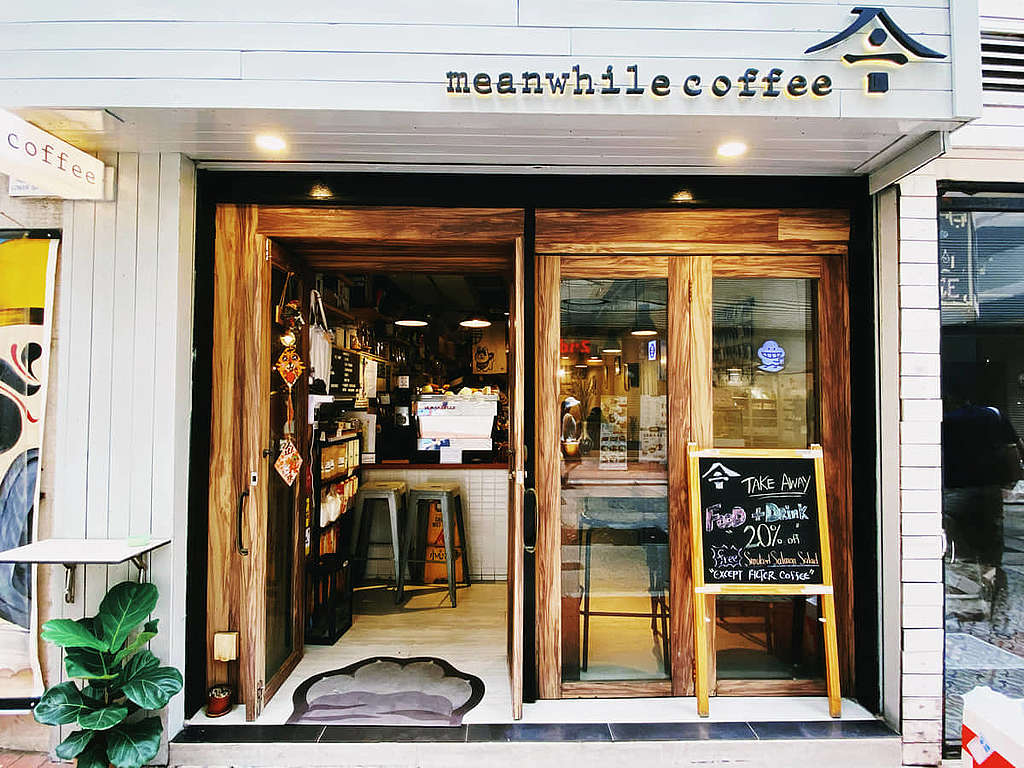
Ricky was one of the few who had heard about similar programs in place in Germany; when Greenpeace began approaching potential Borrow and Return Cup Program partners, a new scheme in Hong Kong, he didn’t mind engaging in the pilot change. He stressed many times what he did was a small kick-off. Daring to try is the essence of his shop name; literally in Chinese, the coffee shop name means “now” and “half”, a status of ongoing learning at the moment, willing to try and to demand self–improvement.”
Backing the trial spirit is trust. He hopes Hong Kong people embrace innovation with encouragement and support. “We don’t want our customers to feel uncomfortable drinking the reusable cup. It’s a must to ensure these cups are clean and hygienic. Hope you’d believe in us and give it a try.”
Cupping Room: Chain Store Engagement for Rippling Changes
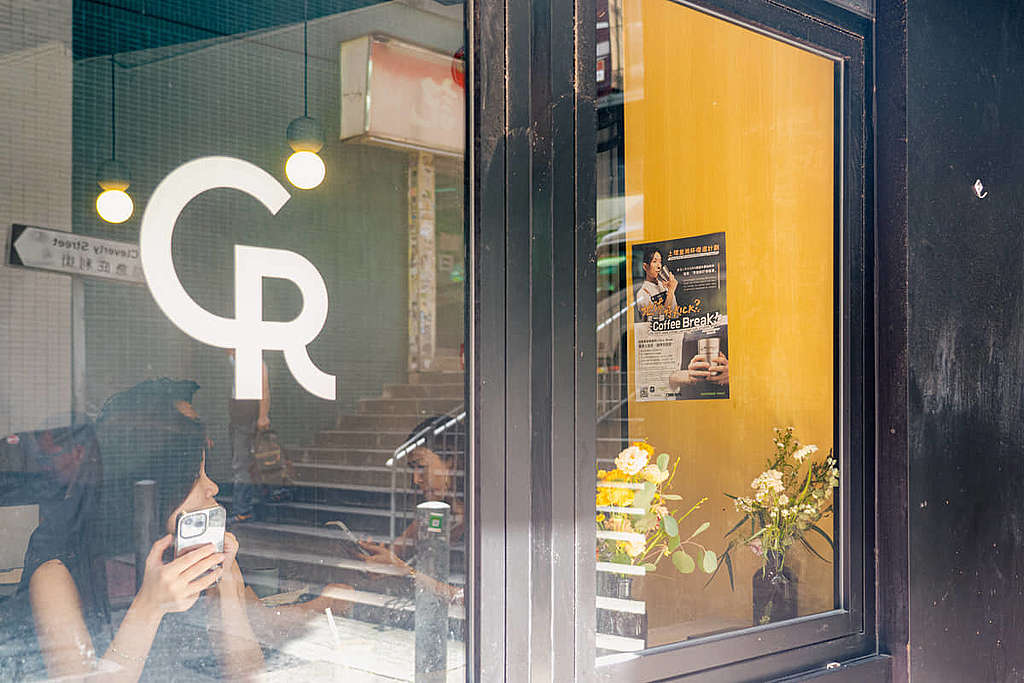
Among the 6 participating coffee shops, Cupping Room is a brand with multiple chained stores. “Environmental protection is about small steps one wants to take from his/her habits. Now, we make it easier for our customers by saving them from the bother of cleaning the cups or bringing cups along with them. We hope more people will engage.”
Cupping Room was founded in 2011. Before the covid-19 pandemic, every 3 to 4 customers out of 10 brought their own cups. Large-scale chain stores in Taiwan have already introduced the reusable cup program, and Hong Kong lags behind its counterpart in plastic-free scheme implementation. Cupping Room hopes to bring about rippling changes in the community, spreading environmental protection messages further away. “Our brand has a higher recognition, and our promotion channels have a wider reach, so we would like to help spread the message across.”
GreenDoor: Persistence for Offering Customers An Option
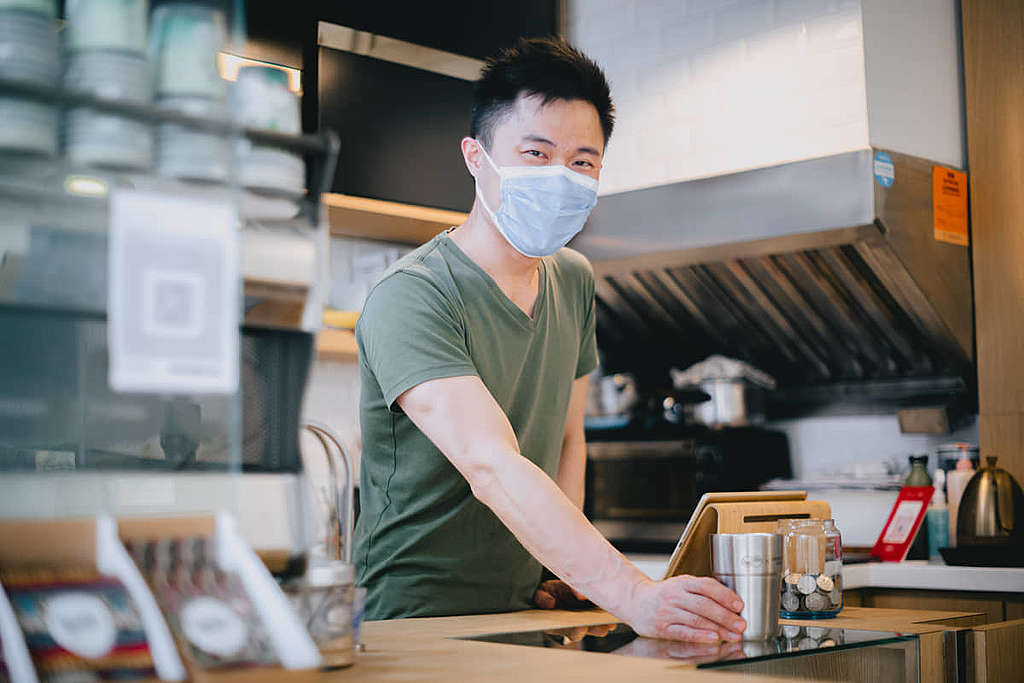
“What we do is not to satisfy 100 persons, but 10 among them.” Knowing the reality is the prerequisite to staying optimistic and doing the best for oneself in desperate times. Shop owner of GreenDoor, Ah Kong claimed himself to be pessimistic but determined to join the reusable cup scheme. With limited choices of suppliers, he felt the Program is meaningful and would like to offer an option to his customers. “It’s always nice to have an option, and we offer the (Borrow and Return Cup Program) option.”
Ah Kong shared the business experience in the old shop, where customers argued about using paper cups instead. “They think paper cups are cleaner, yet the reality is the production line (might not care much as) .. our colleagues do, who ensure they wash their hands frequently.” Washing tableware is a kind of reflex action dining out, “after all, there is always a customer or two worries about the hygienic problem of a cup”. He thought about substitutes such as paper strew but it would increase production cost; thus he concluded, “it’s better not to use strew at all.”
Knead: Coffee Cup is Just a Beginning, Salad Bowls Could be Next
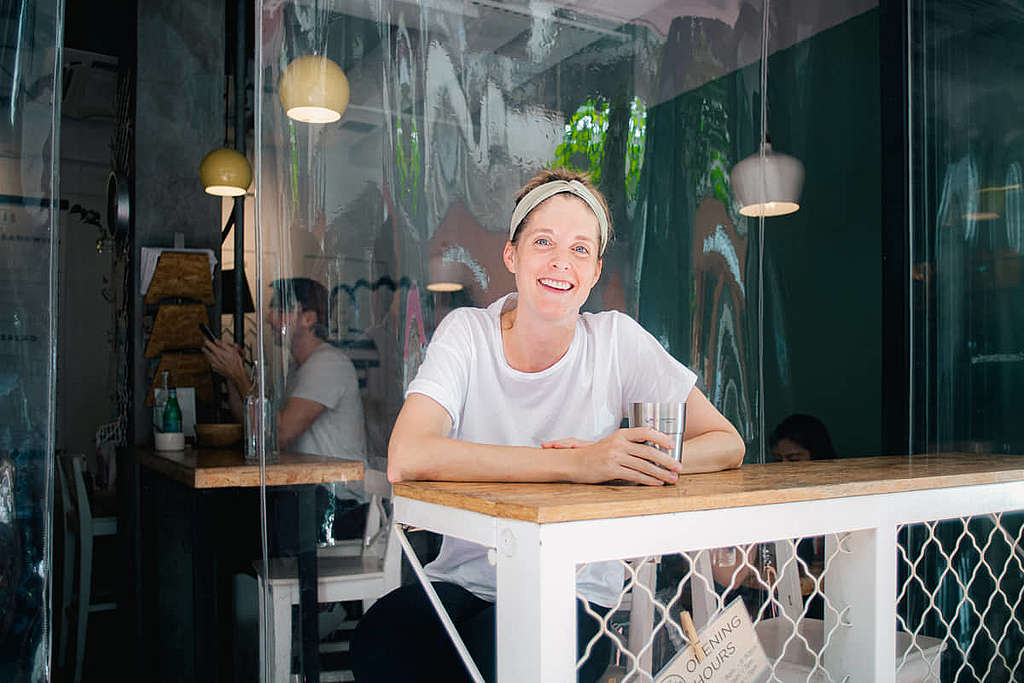
During the lunch break, most office staff opt for takeaway services. Joosje from the Netherlands told us her proud signature item fresh cheese sandwiches has been taken over by salad in sales volume in recent years. She is keen on supporting local agriculture while facing difficulties in implementing a sustainable economy. What about the reusable cup program? Though coffee is not the main serving of the shop, she sees this Program as a good chance to promote the reusable container scheme, “coffee cup could be the first move, and hopefully we can push for borrow and return salad bowls!”
Joosje found Circular City, the app development start-up partner of the Greenpeace Borrow and Return Cup Program, at a billboard in Discovery Bay earlier. She proactively asked if the Program could cover salad bowls in addition to coffee cups. She revealed that even though she offered a bring-your-own-container promotion discount at her shop, participating customers would be about 5% only. For 11 years since she came to Hong Kong, she witnessed the gradual improvement of environmental protection awareness among Hong Kong people. “Maybe (I’d) make a shelf where people can get like salad bowls and everything is reusable,” and she was expecting to see it happen by the end of this year.
Join us to give our Earth a coffee break!
Download the mobile app #ch00ze and complete the simple step of registration. Show the QR code at one of the 6 coffee shops you visit for your takeaway service, and your coffee would be delivered to you in a reusable cup. Return the cup to any of the 6 participating shops in 7 days, and you’ll be a part of the plastic-free program!
Click to try out the Borrow and Return Cup services
Learn more about Greenpeace’s Sheung Wan Borrow and Return Cup Program Gives the Earth a Coffee Break
